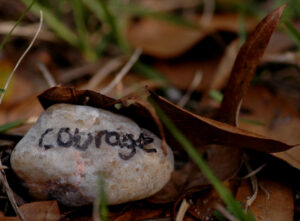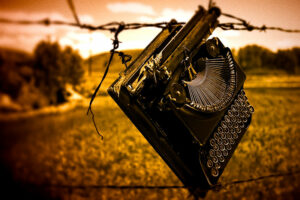Posts by Rachel Toalson
For as long as I can remember, I’ve wanted to be a writer. I know that’s not every writer’s journey. Some come to it a little later. Some much later. But as soon as I had my first taste of a book, I wanted to write. I wanted to create in others what I felt when I read a book. Joy. Wonder. Hope.
When children dream, they don’t know to doubt themselves. (I also wanted to be an Avon lady, because I helped my mom hang Avon books on the neighbors’ doors.)
The dream of being a writer never wavered, although I grew up in a low-income household and I soon learned what people thought of the “poor” desiring creative careers. We were supposed to be working people, not people who dream of writing books. What kind of living was that?
Pursuing that dream got more complicated in college, where I was on full scholarship. A well-meaning academic advisor suggested I choose something like journalism, which would have a steadier income than creative writing. I wouldn’t know until later that this suggestion was likely because I was a scholarship and federal grant student. I didn’t come from money.
I worked in journalism for a while, but the writing dream never left me. I wanted to write books. Fiction books. For everyone, but especially kids and teens.
It took me more than a decade—when a lay-off finally cut off my steady income—for me to decide I’d ignore all those voices that told me writing books wasn’t what I was supposed to do or allowed to do or even qualified to do…and do it anyway.
What does a dream cost? Pursuing one is complicated. Sometimes incredibly disappointing. Maddening. Discouraging. And yet some moments it’s so very beautiful I think, My gosh, I’m glad I kept going.
The dream we have will cost us. It will cost us time and energy and sometimes people or a certain kind of life we imagined for ourselves. Hope, too. But there will be glimpses of beauty so breathtaking we’ll think, How incredibly lucky I am. I’m so glad I get to do this.
As we go about chasing this beautiful, ridiculous dream, here’s what I want us to remember:
The dream will take time
It may take much, much longer than we expected or wanted or maybe even longer than we can comprehend.
I’m not always a patient person, especially when it comes to waiting on a dream. Sometimes it will feel or seem like it’s right around the corner, but here’s the honest truth: things sometimes appear closer than they really are. It’s like when I’m out on one of my long runs and I set my sights on something in the near distance—or seemingly near distance—except it never seems to get closer.
The nearness is a mirage. Dreams like to be seen—but they’re not always as close as they appear. We have to make sure we exercise patience, so we don’t settle for a mirage instead of the real thing.
Maybe it helps to remember that part of the dream is its anticipation. And the journey toward it.
The dream will likely cost something “good”
It will cost time or energy or something we like or love. We don’t have unlimited amounts of time and […]
Read More
“Lock up your libraries, if you like, but there is no gate, no lock, no bolt that you can set upon the freedom of my mind.”
—Virginia Woolf
Writers are truth tellers. We always have been. Throughout history, writers have been brave enough to say what needs to be said, through fiction and nonfiction and poetry. George Orwell’s politically charged novels and Maya Angelou’s powerful stories and poems about being a Black woman in America and Ray Bradbury’s truth in science fiction and Ta-Nehisi Coates’s essays on writing and acting and American myth-making—they were and remain important voices that lead their readers toward truth.
Writers forge the way for thought and dialogue and cultural discussion. We are thought leaders. We explore the necessary questions and turn them back on ourselves. Most of us write to discover what we think and believe about the world, and, in the process, we arrive at a certain kind of truth. We share that truth with the world through our words.
It takes a lot of courage to share that truth with the world.
Writers also provide a window into what could be—a vision for the future that includes all people sitting at the proverbial table, belonging in all the necessary places. We infuse our tales of warning and caution and hope with the underlying truth that we all matter, that we all have stories worth listening to, that we are all a necessary part of the human conversation. We see the truth clearly because we write to reflect on the truth, to peel away all the layers of muck covering it. We are philosophers and sages, and sometimes we are even prophets.
Book banning creeps ever closer and expands ever wider, drowning out many of our voices. And so writers—we—are more necessary now than ever.
It’s not easy getting out there and speaking truth to lies. We won’t always feel like writing with our pens as though they can fight like swords, because…well, it can be a very scary thing to do. And who has the energy? And won’t there be consequences? What if they’re…too much?
I’m a member of an organization called Authors Against Book Bans, which works to fight the book bans happening all over our country. We’ve been having regular meetings about the resistance that will potentially come against authors as a new administration takes power in the U.S. We are preparing to stand against that opposition—to use our voices and tell the truth, writing op-eds and essays and stories that protect and preserve our right to write and readers’ right to read.
It reminds me that in 2025 and beyond, the world will need us more than ever to show them what it means to be human, what it means to be ourselves, what it means to live. What it means to honor and accept others and all their beautiful differences. What it means to be a light in the darkness of hate and judgment and misunderstanding.
This will require extraordinary courage and hope and the ability to remain steadfast in the face of opposition—because there will be opposition. There will always be opposition when we are saying something worthwhile. It’s something I often forget. If I am writing about and saying the things that matter, […]
Read More
Lately I’ve been struggling to love my runs.
Life has been busy with kids’ fall concerts, friend and family gatherings, tying up work projects so the holidays don’t throw me completely out of my plot lines and cause a beginning-of-the-year panic, not to mention a deadline pileup. The stress can get to me, make me feel heavy, which makes running much more difficult. It’s easy to say, I guess I’ll just cut this one short.
I don’t, though. I make sure I finish, no matter how slow I log that last mile
I learned a long time ago the importance of finishing what I start, and long-distance running reinforces that lesson every time I head out the door. It’s good practice for finishing what’s hard.
Writing is hard. Finishing my (hard) runs is good practice for finishing my (hard) writing.
If I start my run or writing session thinking, We’ll see how many miles I feel like doing or We’ll see how many words/chapters I feel like doing, I won’t do all I could have done. It’s just a fact of existence. The mind is a powerful vehicle, and if it thinks, Yeah, this is really challenging, I’m just going to give myself a little break, that’s exactly what we’ll do. We’ll give ourselves a little break.
And miss out on what’s waiting on the other side of that challenge.
What’s the big deal about finishing what you start?
Well, it turns out it’s an important practice if you want to hone your creative discipline, build your confidence as a writer, and grow both professionally and personally. And, of course, it helps us achieve our goals. Finishing what we start is an all-around important discipline because it has psychological, neurological, personal, and professional benefits.
This essay is a bit more scientific than my previous essays because (1) I love science—especially brain science—and (2) I believe that when we know the benefits of something it makes it slightly easier to make that thing a part of our lives. So bear with me.
Psychological benefits
The brain rewards completion. What this means is that any time we finish something, like a writing project, the brain releases dopamine, the hormone responsible for our feelings of pleasure and satisfaction. Dopamine comprises part of our reward center. It carves a “wow, that feels good” into our memory and boosts our motivation to repeat the action.
So our brain remembers how satisfying and pleasurable it felt when we finished that challenging, never-ending project, and it says, “Hey! Let’s do that again, because I like this feeling!”
This is something I’m constantly trying to help my ADHD kids master. The ADHD brain has a lower level of dopamine than a neurotypical brain in the first place, which makes finishing things challenging (so I do understand that some of us might be working at a disadvantage). But practice makes progress. Every time we finish what we start, we practice that discipline, and it gets a tiny little fraction easier the next time.
Other unrelated writing things (but everything’s related, isn’t it?) that boost our dopamine levels include yoga, exercise, and meditation.
The brain also craves completion, so when we mark that task off our list—whether it’s writing a chapter for the day or completing a whole book—our brain sweeps […]
Read More“Oh my goodness!” a young blonde woman said. “Are you a real author?”
I was sitting at a display table inside my local Barnes & Noble, signing my latest book.
“Is this your book?” her friend, a brunette, said. Without waiting for an answer, she picked up my book and flipped through the pages.
“It’s my story,” I told her.
“I don’t know if I could ever do that,” the blonde said.
“Are you interested in writing?” I said.
The blonde pointed at the brunette. “She is.”
“I haven’t really written anything,” the brunette said. “But I would like to someday.”
“Someday could be today,” I said.
“I don’t know how you do it,” she said.
“One chapter, one page, one word at a time,” I said.
The two of them stayed at my table until the next reader showed up. They didn’t ask me to sign a book. But that was okay. They offered me an opportunity to encourage other hopeful writers—which I love doing. I hoped they’d carry my words home instead.
I feel privileged to meet so many young writers when I’m out and about in a professional capacity. But many of these encounters leave me feeling a deep longing for a better collective understanding of what it means to be a writer.
Writers can be some of the most self-conscious, unconfident people. They minimize their abilities (though we’ve all met writers on the opposite end of that spectrum, I’m sure). Many of them struggle to believe they know what they’re doing. They question everything.
I remember doing the same as a young writer. Did I have what it took to succeed? Was I even any good at writing? How did one write a book?
(These questions, by the way, still visit me in my most unconfident seasons. I think that’s pretty normal for writers. Doubts don’t go away forever; they just visit us in cycles.)
As writers, we put ourselves out into the world. Invite people into our private thoughts. Wait for them to judge (and judge they will). And that’s terrifying.
So much can knock our feet out from under us. I recently discovered one I didn’t quite expect but probably should have.
I had a conversation with my agent about a young adult book I wrote. It deals with a personal subject that calls an institution to task (that’s so vague and helpful, I know). My agent said, “It might not be the best time for this book.”
“Oh,” I said.
“Don’t get me wrong,” she said. “I love it. But it will likely be banned.”
Book banning. That will certainly punch a hole in our confidence. Make us question whether book banners have a point. (They don’t.)
There are other shaky places in a writing career. All the rejections we accrue for a manuscript we love. A sticky place in a manuscript that won’t work itself out. Even something as simple as a friend getting a nice award or accolade while we get… a collection of bad reviews.
When we’re wallowing in despair about our chosen career and questioning whether we really want to put ourselves through this heartache indefinitely, here’s what I want us to remember:
Our stories matter—and no one else can tell them
You know what books can do? They can change the world. They can change hearts and minds and perspectives […]
Read More
My husband recently took a trip out of state. My kids went away with grandparents, and I was alone for three days.
“You should just relax,” my husband said before he disappeared into the airport.
Instead, I pretended I was on a writing retreat.
I wrote more and for longer hours than I have in a very long time. And even when I broke for dinner, I felt passion for my stories drawing me back. I had to talk myself out of continuing to write and instead spend an hour reading before bed.
Without any demands on time outside of my own needs (and yes, I forgot to eat a few meals some of the days, so accustomed am I to having kids at home begging me for lunch and reminding me humans need food), I lost myself in my inner worlds.
For me, writing is an obsession.
If I let myself, I would be a workaholic. I have trouble pulling myself away from my work because it’s an obsession. It’s also much more than that.
But before I get into that, I must acknowledge: I know writing is not an obsession for everybody. It takes hard work and dedication to show up to the page every day. Many might even consider me lucky——though anything taken to the extreme can be problematic.
My interest in writing goes deep. It started early, when I was very young and fell in love with stories. I loved the way stories could take me away from the world I inhabited. I couldn’t wait to bury myself in a book and spend time in other places, with other people, living lives I’d probably never live myself. And it didn’t take long for me to decide I wanted to create those places and people and lives in the stories I’d write.
I consider what I do my purpose. Telling stories is what I was made to do.
Many of us feel that way. Maybe even most of us. Why else would we come back to the relentless blank page?
But there’s something else I’ve noticed in my years of pursuing this dream, and it’s this:
Writing does the most work on us. It changes us for the better.
Writing centers us.
When I write, I become a calmer person. I make sense of my chaotic world. I dream and imagine and explore. I quiet all the worries and anxieties that pursue me. Writing is my stillness and my solitude. It allows me to take a breath, reconnect with myself, and remember all the good that’s in my life (and there’s so much!).
I remember a woman laughing at me, way back at the beginning of my writing career, when I confessed to a room full of people that writing made me a better mother. My children were very young at the time. And so needy. Writing, I felt, helped me balance that neediness with seeing to my own needs, thereby making me a better mother.
The woman made a beeline for me after the event was done. She said, “If you want to write and work, fine. But call it what it is—you just want to write and work. It doesn’t make you a better mother.”
I was taken aback, because how could she know? The days I managed […]
Read MoreI’ve been in a funk lately.
I probably should have expected it. This always seems to happen when I spend time around those I consider writing giants. Heroes, maybe. And I recently attended the Texas Library Association’s annual conference, where I joined other authors promoting our new books, meeting librarians, signing Advance Reader Copies, and celebrating reading.
It should be a happy time. What better place exists than where writers and readers talk books?
But a voice chased me everywhere, dogged in its pursuit. It said, You don’t belong here, you know.
At first I talked back. I do, though, I told the voice. I’m an author, too. And I have stories that are worth telling and reading.
But the voice was persistent. Is persistent. And cunning. It spoke more insistently. Look around, it said. They’re all WAY ahead of you. You’re a nobody. No one knows about your books. No one even cares.
You can only talk back for so long before the voice starts gaining ground. Before you start agreeing. Yeah, I thought. These authors are way more successful than I am. What do I have to offer anyone?
Maybe you’re familiar with this voice. Most writers are.
A friend recently suggested she and I team up and submit some proposals for teaching at conferences, and my first thought was, I don’t have anything to teach, though. When I started writing for Writer Unboxed—and even now, before I began this essay—the voice whispered, What do you have to contribute that’s worth listening to?
Nothing, I thought. Absolutely nothing.
Imposter syndrome is a villain of practically every writer on earth. So you’re not alone. I’m not alone.
That doesn’t always help.
Learning more about it can sometimes help a little.
Imposter syndrome is a psychological phenomenon that attacks sufferers with feelings of self doubt and inadequacy and includes a persistent dread of being exposed as a fraud, despite all the evidence in our professional lives that proves we’re not. Usually it’s a somewhat temporary state the comes and goes. Sometimes it can be persistent (if it has been for you, don’t be ashamed or afraid to get professional help).
It’s usually debilitating to our creativity.
Imposter syndrome can manifest as perfectionism and overachievement—to prove to ourselves and others that we’re “good enough.” It often produces a fear of failure that inhibits our risk-taking or keeps us from putting ourselves out there or speaking up for what we want or need. We downplay our success or attribute it to luck instead of our skills and abilities and the great effort we’ve put into our craft. Subconsciously we think our success was just luck or the right timing.
I believed this about my agent for a long time—I didn’t really deserve an agent, I thought. I just caught her at the right time, when she was looking for a novel in verse and I had one of those. Even after we’ve sold seven books together I still find myself thinking, It was just luck. And it’ll run out any minute now.
At what point does it become more than just luck? Don’t ask imposter syndrome that. It will say, Never.
Creative activity is subject to what the brain is saying at any time. And our brains are not always nice.
You might hear judgments like I hear. […]
Read MoreWriting a book takes a long time. It’s a huge commitment.
That’s possibly why so many people I meet who tell me they want to write a book never even get started. Or maybe they get started but they don’t stick with it. (They’d be joining about 97 percent of people who start a book, according to some statistics.)
The most important things we can do to write a book is do the actual work. Get your butt in the chair or stand at your computer and write.
This isn’t original advice. I’m not the first to say it. I read it in a book about writing, though I can’t remember exactly which one (probably all of them). In my search to find the origin of how this advice came into my life, though, I did stumble across a Stephen King quote that I highlighted, underlined and starred to death:
“Amateurs sit and wait for inspiration, the rest of us just get up and go to work.”
That’s it. Essay done.
There’s more to it than that, though, isn’t there? It’s easier said than done. Writers are notorious for making simple things more complicated (or maybe that’s just me).
Time to write can feel really hard to find. When I was first starting out as a serious writer, I’d just had my sixth baby. I also had twin 2-year-olds, a 4-year-old, a 5-year-old, and a 7-year-old. Time? I had no idea where to find that or if I ever would. But I’d also just been laid off from a job that made me miserable, and this was my chance. So every night, without fail, I took out a notebook and wrote.
It took me a year to get that first book written. But after working every single day, whether I felt like it or not, I had a book. A very messy but complete book. You can’t revise what doesn’t exist, I told myself when the doubts crept in mid-writing session. Just keep going.
Writers often ask me how I get so much done. How I write so many books. Well, I do the work. I work really hard at the work. I schedule writing sessions, and I write. And sometimes that writing is terrible, and sometimes it’s almost great. Sometimes it’s a little of both. I just keep moving forward, regardless of how the session is going at that point in time.
And there’s a hint in my process: I schedule my writing sessions. I realize not everyone works well with a schedule—but it does help develop a habit. My kids now know what time I write, and they know not to disturb me during a writing session unless it’s an emergency (and we’ve had multiple conversations about what constitutes an emergency, trust me; no, it is not an emergency that someone lost his favorite Pokémon card).
At the heart of it, writing a book comes down to dedication. We make time for what’s important to us. Is writing important? Then we find time to do it.
Something hard like writing a book, which demands a lot of time and energy, requires discipline. Doing the work.
Recently my husband asked me if I wanted to join his band. We used to play in a band together, back when we were first married […]
Read MoreWriting can be a lonely pursuit.
Composing books requires hours of solitary work, shutting ourselves away for short 10-minute bursts or hour-long sessions. And not just one shut-away chunk of time. Hundreds. More.
I don’t mind being alone. I’m a solitary person. I run alone, spend the bulk of my weekdays alone while my kids are in school, write alone (most of the time). I live in a house full of people, and maybe that’s why this alone-time is so valuable to me. My days are also filled with frantic activity and loud voices and constant questions. Solitude feels peaceful (though I wouldn’t want it all the time).
Writing can also be a shared pursuit—and perhaps it should be.
That’s not to say we should write with people, or that the only writing that counts is when someone else is in the room. It’s only to say that, like most things, we’re stronger together. And we’re all in this together.
We’re all in this together.
Even in our solitary work, our solitary pursuit of a writing career, it’s important to remember that we should be generous with each other. It’s not a competition. We’re all on the same team. We should be lifting each other up instead of tearing each other down.
I’ve recently seen some alarming activity in the writing world, writers pitted against other writers. Inflammatory things said and done. Public condemnation. It all makes my head and heart hurt. Maybe it’s the social conditioning I had as a kid—if you don’t have something nice to say, just don’t say anything.
That’s not always the answer. I know that. Callouts are necessary. It’s how we change things that need changing. It’s how we flag bad behavior and erroneous beliefs.
But.
We live so publicly as writers. We point out wrongdoings publicly—and I’m not saying we shouldn’t point out bad behavior. But can it not be done less publicly, maybe? Can we at least remember there’s another human being on the other side, however misguided they may be?
So many people are hurting. And writing is a lonely pursuit. We carry our burdens alone. Some of us never learned that’s not the world’s fault. Some of us never learned there’s enough room for all of us. That’s not an excuse for bad behavior. It’s just context. And context is necessary when we want to be empathetic human beings.
What do we owe each other? Certainly not blind allegiance. The recent past has taught us there are writers with problematic belief systems and worldviews. People who do terrible things. People who disappoint others with their actions and words.
But maybe we owe each other dignity? Respect? An I-see-you nod? I don’t have an answer to that question.
As a writing community, though, I believe we do owe each other some level of support and empathy. We’re all trying to do the best we can with what we have—but we’re not perfect. We’re human.
Some of us can lose ourselves in this business. It’s not an easy one. We need each other to lift the lost and broken back up and remind them who they are. Who we are.
When people do egregious things, I don’t always see them through the eyes of compassion. I have to work really hard to get there.
And I’m not always a […]
Read MoreI’ve launched several books into the world.
The first time I did it I remember feeling such a large and heady excitement I could hardly contain myself in the days leading up to the release date. I’d spent years on the journey already: writing and rewriting and querying agents, getting rejected, finding an agent, revising again, going out on submission, getting rejected again, selling the book and revising again. The launch of my book out into the world was the culmination of all that hard work and proof (if only to myself) that I hadn’t done it all for nothing.
Who wouldn’t be excited about that?
The day came and went. I’d prepared for weeks, unfolding a marketing campaign that didn’t feel like marketing so much as sharing what I loved about my book and the topics and themes it explored. I spent a few weeks traveling around Texas, visiting various bookstores for signings, making appearances at schools and conferences…
And then it was over. And I was completely and utterly burned out.
Depression set in fast.
Writers are sensitive people. Our books mean a lot to most of us. We spend so much time and energy trying to make them perfect so someone else can enjoy them. We spread ourselves thin to make sure we’re giving our books every shot they have to make their mark on the world. And the work of it all demands just about everything from us.
Every part of the writing journey is a challenge emotionally, physically, and mentally. Writing something from start to finish. Trying to find it a home. The waiting game we play perpetually forever. All the rejection. Reviews once we offer it to the world.
Balance feels very difficult to find. I’m an author who’s also a mom (of six boys), and sometimes those two things can feel like they demand everything from me—and more. It’s exhausting.
All that takes a toll. And sure, we bury our heads and get started on the next thing, but our thoughts and emotions and physical exhaustion from the mental and emotional overload don’t just go away because we ignore them. They needle. They slink through shadows and jump-scare us when we least expect them, when we’ve let our guard down. One thing goes wrong and we find ourselves uncharacteristically crumbling.
No one can burn a candle at both ends forever. We’ll burn right out. And if we burn out, the world doesn’t get the privilege of reading our stories.
It’s important for us to take care of ourselves in every stage of the writing adventure. Here are some of my favorite suggestions for how to do that.
The Writing Stage
The writing stage can be a very exciting time. But it can also overtake everything. We’re tempted to work all the time because we’re so excited to write down what’s been trapped in our head. And burnout can set in pretty quickly if we’re not careful. So…
Nurture your mind. Our minds are arguably our most important assets, the home of our creativity. And they can get overwhelmed and exhausted during the creation process. We need to make sure they’re in good shape—which means stretching them and resting them.
Carve out time to just be—be present. Connect your mind to your body. Take a walk […]
Read MoreThe first traditionally published book I wrote happened in small increments of time. Ten minutes here. Fifteen minutes there. If I was really lucky, I could snag a whole half-hour to myself.
That’s what it felt like: snagging moments as they flew by.
At the time I had a newborn, twin three-year-olds, a five-year-old, a six-year-old, and an eight-year-old and I worked a full-time job. Time was a construct of the imagination. I could barely boil tea or brush my hair or visit the bathroom without a sweet little boy calling for Mama.
But I had a story threatening to burst me.
So while my children bathed, watched by their father, I shut my bedroom door, set a timer for ten minutes, and wrote furiously, words splitting out of me.
It was not a pretty story when it was all said and done. But it was a story. The bones. And I had a feeling they were good. And that meant I could turn them into something better.
I tell you all this to say it’s possible to write a book in ten or fifteen minutes a day. Sure, it may take us a year or two to get that first draft down, but the important thing is—it’s a draft. It’s something we can work with. And words on a page are better than words trapped in our brain, clamoring to get out. (Ironically, the voice begging me to write this story belonged to another boy, as if I didn’t have enough of those asking for things!)
Not many of us have hours at our disposal to write on our works-in-progress. We have full-time jobs or family demands or life crises to manage. If we wait until we have hours at our disposal to write on our work-in-progress, we’ll never actually make progress. We might as well call it a work-in-stagnation. Or an idea.
So how do we use those small pockets of time available to us? And where can we find them?
First, let’s start with where to find them. I have three suggestions—but I bet you can come up with more.
1. Use commute time to write.
I have several friends who use dictation while walking their dogs, driving places, or traveling. If you find it too hard to actually write scenes or sentences that make you proud to be a writer, try outlining a scene or creating a character or dictating descriptions of places or people you see. All that can be used later.
2. Trade social media time for writing time.
Many of us spend much more time scrolling through social media than we even realize. Schedule the time you’ll spend on those platforms, instead of letting them suck you in indefinitely. Put limits on your devices. Enlist a friend or partner to hold you accountable. Take back the time and write.
3. Use your lunch breaks.
I’m all for mindful eating, but sometimes you have to take that ten or fifteen minutes where you can. Eat while writing. Or wait until you’re done eating. Close your office door (if you have one) or hide behind some earbuds and write.
Be creative in looking for other pockets of time.
Now, how can we use those ten or fifteen minutes so they yield what we’re looking for: words, progress, and brilliance (maybe)?
Set a timer […]
Read MoreThe morning slides right off me, pooling into my cooling sleeves. Sunrise is an hour away, and already it’s close to ninety degrees, with humidity in an astronomical percentage. My body feels heavy. My brain feels heavier.
I’ve had few truly enjoyable early morning long runs since the summer began.
Some seasons are like that.
I have to remind myself of many things when I walk out the door, headlamp strapped on, hydration belt positioned on my hips, to begin my warmup of calf raises, high knees, and skip-strides. They become mantras as I slog through the miles, one at a time, the end so far removed from the beginning I can hardly imagine it.
As a (amateur) runner who logs anywhere from 55 to 65 miles every week just for fun (I know), I’ve learned a lot about writing from my long-distance running habit. It may seem strange to equate the two—one is incredibly active, the other not so much. But both use the same kind of persistent focus. Both require stamina and dedication. Both are incredibly difficult to finish strong.
Here’s what I’ve learned about writing from long-distance running.
Run the mile you’re in. Write the chapter you’re in. I don’t walk out the door for a twelve-mile run already thinking of the twelfth mile. The run would be doomed before it began. I focus only on the first mile. And then the next mile. And the third, and on and on and on.
So often, we start a story and we already can’t wait to get it done. Part of the excitement of writing is the vision we have for the end product. But if we keep our eyes focused on The End and how far we have left to go, instead of where we actually are in the project, we can easily lose our focus and our enthusiasm for the project. The finish line is so far away! We still have to get through the Fun and Games section! And the Bad Guys Close In! And the Dark Night of the Soul and everything that comes after and…maybe we should just quit. We’ll never make it.
It’s important to write the chapter we’re in. Resist the urge to measure how much farther you have to go. Find your stride in this chapter and watch the words, one after another, propel you along the path of progress.
Every day is different—some days are great, others are slogs. A coach I know tells his runners, “Today’s legs are not yesterday’s legs.” Meaning: We may not be able to perform today at the level we did yesterday.
We’ve all heard the saying “comparison is the thief of joy.” That’s true when comparing ourselves to other people, but it’s also true when comparing ourselves today to ourselves yesterday. Not every day will be a perfect productive day where we write two thousand perfect words. And we can’t put that kind of pressure on ourselves.
Some days we’re tired because we didn’t get enough sleep. Or we did too much people-ing and feel completely burned out. Or the kids are home for the summer and really like to talk and there’s no quiet corner in our house where we can find a minute to think, let alone write.
Some days are slogs. Some […]
Read MoreTherese stepping in for a moment to introduce our newest regular contributor, multi-published author Rachel Toalson! You may remember Rachel from the interview our own Grace Wynter did with her several months back. (If you missed the interview, it’s worth your time — just click HERE.) Rachel’s generosity of spirit made it seem like she was a WU’er already, and happily for us she was interested in making it official. Welcome, Rachel!
Very few writers I know would consider a book easy to write. Most books require considerable commitment, time, and dedication—which, some days, translates to complete enthusiasm and love for the very best job in the world and some days translates to a slog akin to running a half-marathon in ninety percent humidity.
As writers, we come to expect these ups and downs, these easy days and difficult ones.
But what about when a book feels hard all the time?
Some projects give us more trouble than others. They feel hard to brainstorm, hard to write, hard to revise, hard to diagnose, hard to finish, hard at every stage of the process. Even if we have all the tools we need—an expert grasp of story structure, enough experience with character development to write a book on it, and an open mind ripe for collecting ideas—some projects are still harder than others.
What do we do when all our familiar tricks and skills don’t unlock a difficult book?
First we need to analyze the problem.
The first question I ask about a project giving me trouble is, “Why is this book so difficult to write?” I try to be honest about the answer. And what follows are the most common traps I’ve discovered in my own writing.
Sometimes a book feels difficult because we haven’t done enough work up front on the manuscript.
I know there’s a debate between pantsers and plotters. I’m what I call a brainstormer. I brainstorm characters and plot and character journey and setting before I even write the first word—and yet sometimes I still run into a project that feels practically impossible to write. Usually this is because I’ve rushed the up-front work (because I just want to get started!) and I still don’t know enough about something in my story—whether it’s the main character, the supporting characters, the plot, the setting, the emotional wound, the character arc, the motivations that drive my characters, or even the tone or voice I want to use to write the story.
If a book feels difficult because you don’t know enough about it, go back to the beginning. Examine the character. Listen to them speak. Figure out what you’ve missed along the way and be open to pivoting.
Sometimes a book feels difficult because we’re putting too much pressure on ourselves.
Writers are great at this. We start a book, and we forget that we’re just writing that first draft for ourselves. Little thoughts start sneaking in—What will people think? Am I getting this right? Where will this be positioned in the market? What will my critique partners/agent/editor say about it?
Or maybe they’re not questions. Maybe they’re definitive statements like, This is terrible. This is the worst thing I’ve ever written. I am a horrible writer. I can’t believe I thought I could do this. I […]
Read More



















